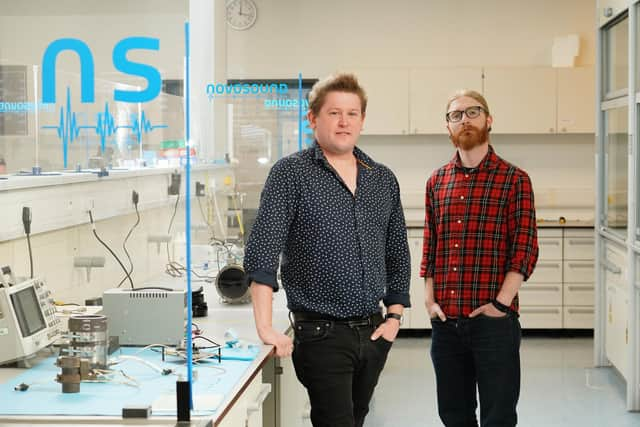Glasgow remote sensor pioneer Novosound sinks teeth into dental tech contract
The research and development (R&D) and subsequent licensing deal is with a venture capital-backed Israeli company, dSound, and will see the Scots firm deliver 3D ultrasound technology to the dental imaging market. The tech enables dentists to look “safely and painlessly” at the tooth and bone under the gumline.
Founded in 2018, Novosound has developed a patented thin-film manufacturing process, which is said to eliminate conventional limitations in ultrasound sensors including the high cost of high-resolution imaging. It also underpins the company’s pioneering non-destructive testing (NDT) products - the Kelpie, Belenus, and Nebula.
Advertisement
Hide AdAdvertisement
Hide AdThe firm was the first spin-out from the University of the West of Scotland, and recently secured contract wins with aerospace giants BAE Systems and GE Aviation.


Chief executive and co-founder Dave Hughes said: “Dentistry is currently undergoing digitisation with the emergence of new advanced imaging techniques, and we see scope for our high-resolution ultrasonic technology to make a big impression, first in dental but then across other segments of the global 3D medical imaging market.
“As well as my background in dental ultrasound imaging from my PhD, getting into the healthcare market comes round full circle for us. One of my academic projects that inspired the founding of Novosound was a collaboration with Current Health’s Chris McCann.
“This was back in 2016 at the University of the West of Scotland, when we secured early-stage R&D grant funding to develop an ultrasound sensor for a medical device to monitor patient hydration levels,” he added.
Last year, the company appointed Dr Derek Mathieson, former chief marketing and technology officer at Baker Hughes, as its chairman. Also, in 2020, the firm appointed former BGF investment director Duncan Macrae as chief financial officer.
In December 2019, Novosound secured a £3.3 million investment round led by private equity investment management firm Foresight Group, via the Foresight Williams Technology EIS Fund. Par Equity, Kelvin Capital, Gabriel Investments and Scottish Enterprise also participated in the round.
The firm’s Kelpie sensor flexes, twists and bends to inspect difficult shapes and surfaces, the Belenus continually monitors corrosion at high temperatures, while the Nebula is a cloud-based platform that securely stores and reports client asset data.
Hughes said the onset of the pandemic had significantly increased demand for remote monitoring to advance safety and efficiency.
Advertisement
Hide AdAdvertisement
Hide Ad“It feels like we’ve seen about ten years of progress in the last 18 months alone,” he said recently. “The technology in the space hasn't really moved on much over the last few decades, and we’re now showing that we can move the dial and add significant value across a number of industry sectors.
“It’s also notable that Scotland is starting to build an ecosystem in remote sensors, and we’re proud to be part of the growing ‘Internet of Things’ scene here.”
The company is currently in the process of hiring a number of software engineers who specialise in 3D imaging to help deliver its ultrasonic platform.
A message from the Editor:
Thank you for reading this article. We’re more reliant on your support than ever as the shift in consumer habits brought about by coronavirus impacts our advertisers. If you haven’t already, please consider supporting our trusted, fact-checked journalism by taking out a digital subscription: www.scotsman.com/subscriptions
Comments
Want to join the conversation? Please or to comment on this article.
